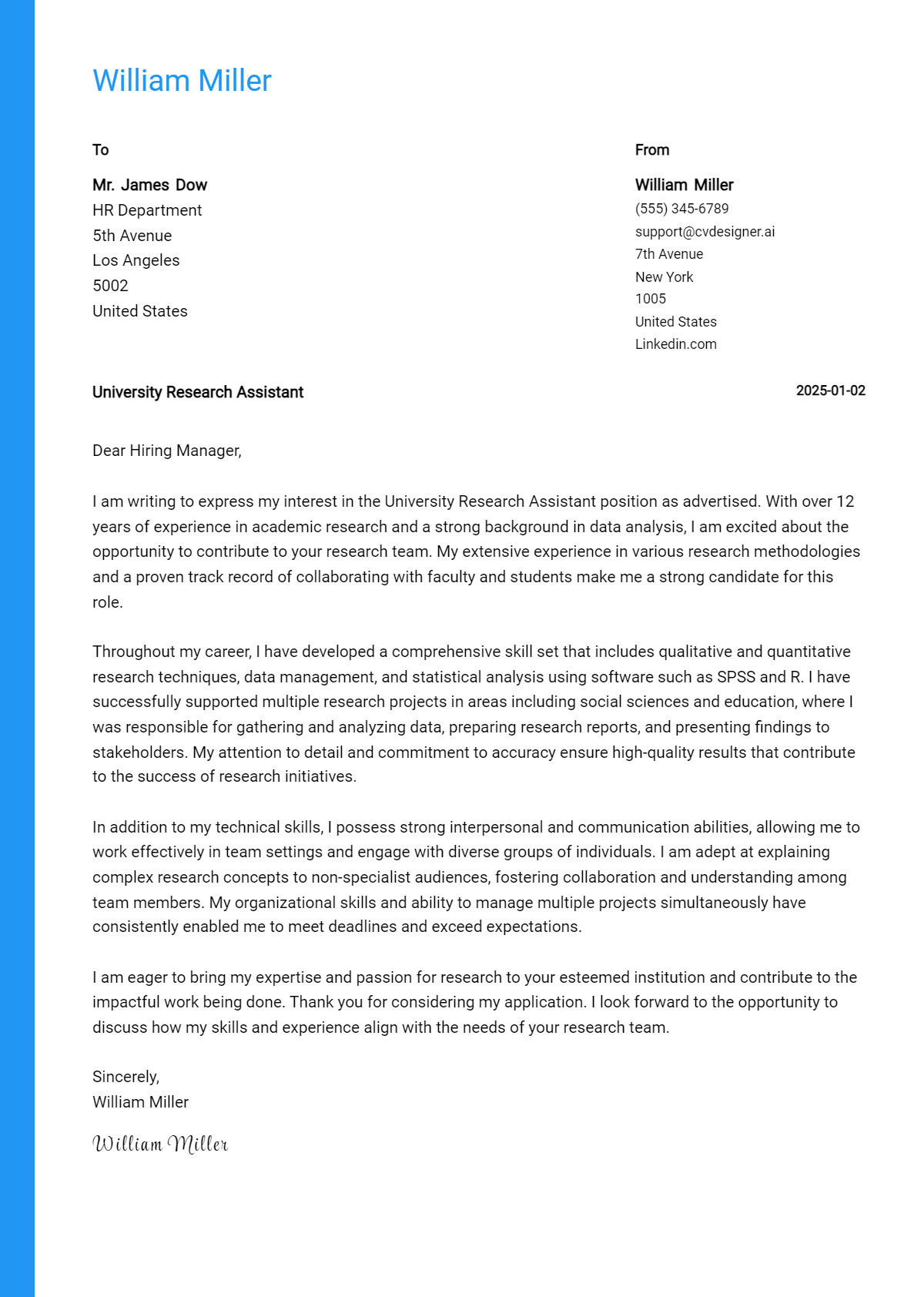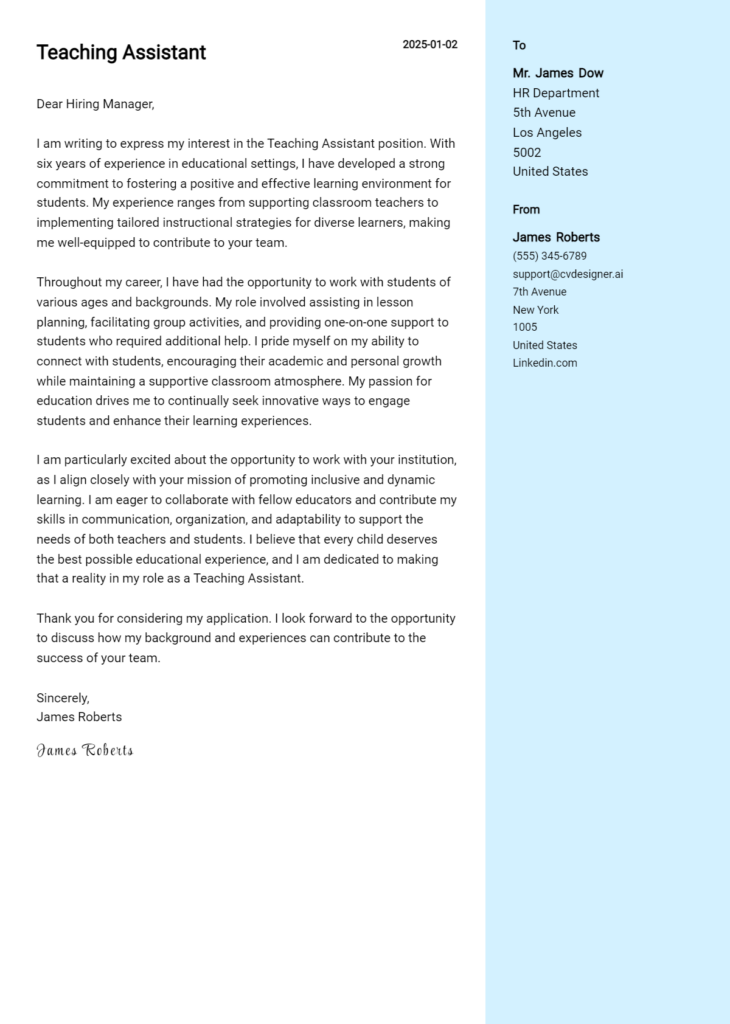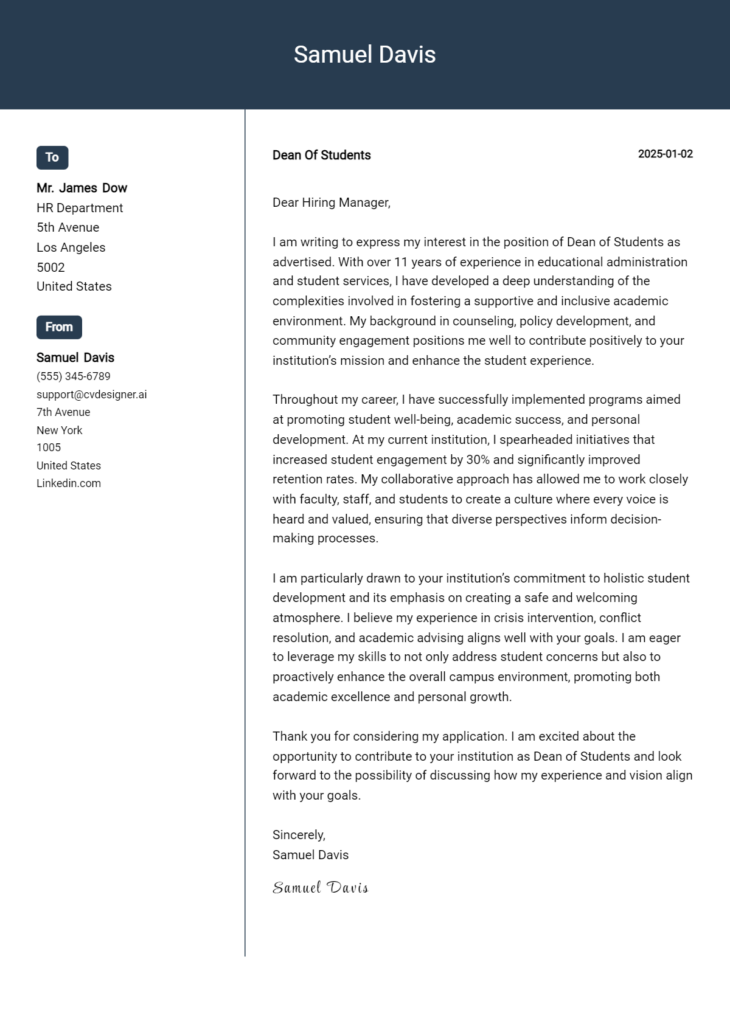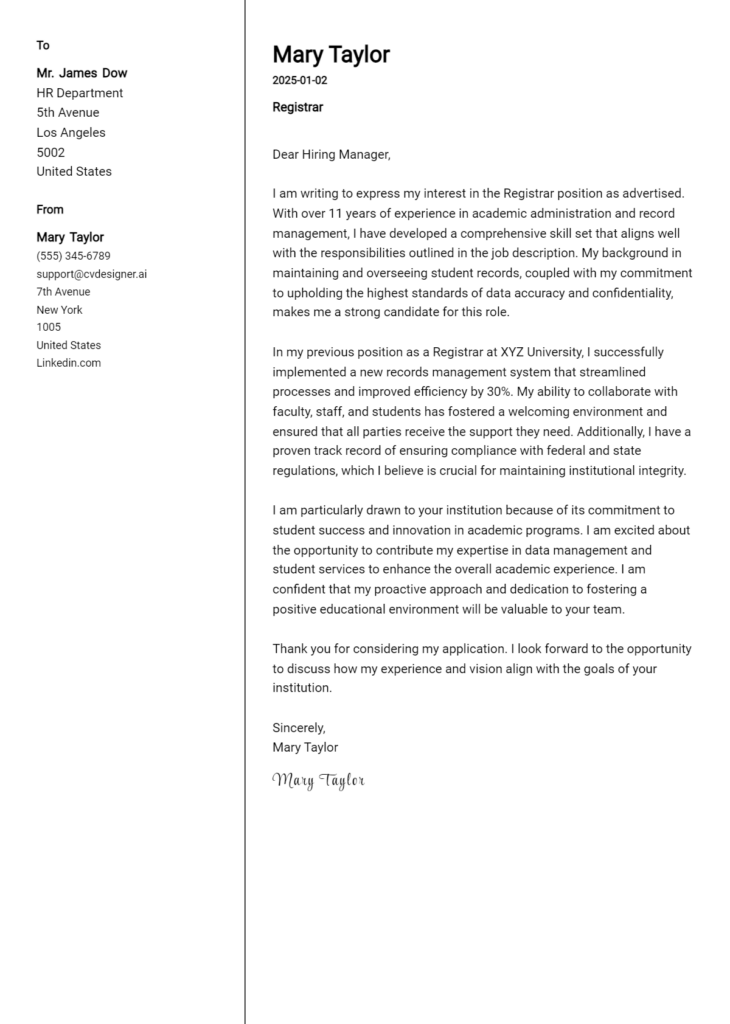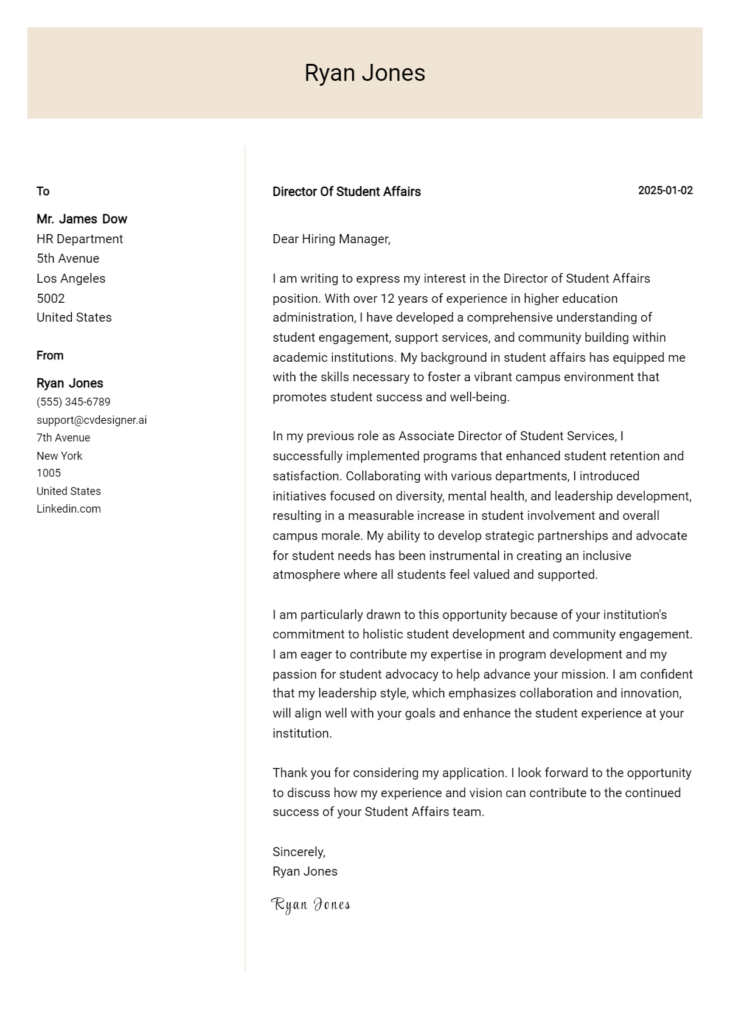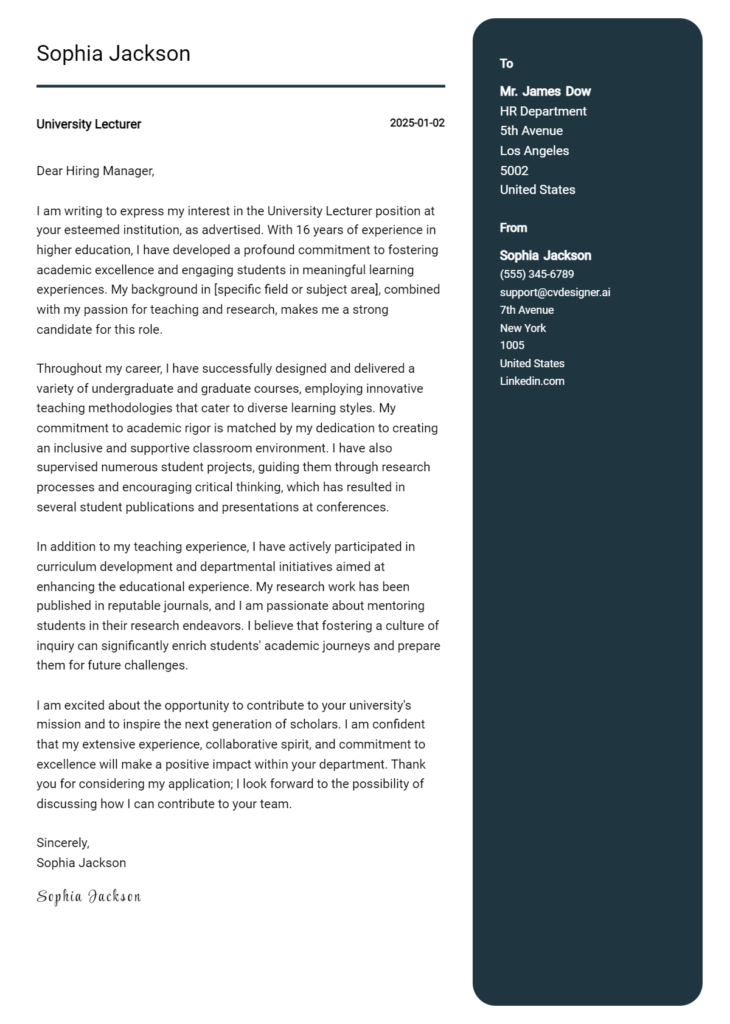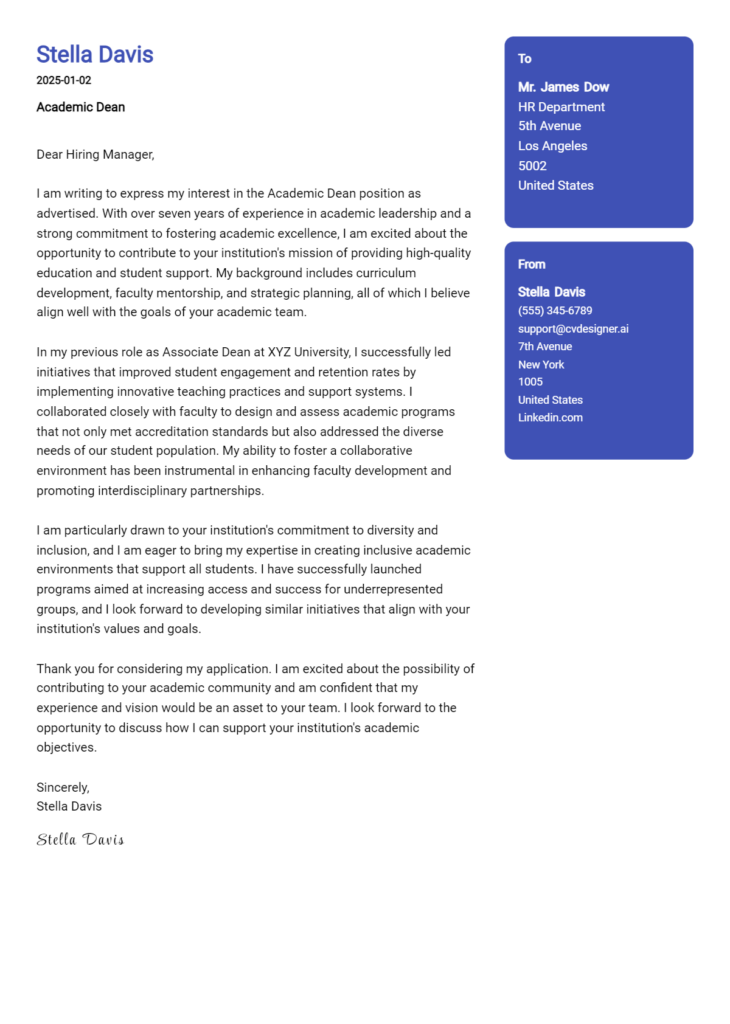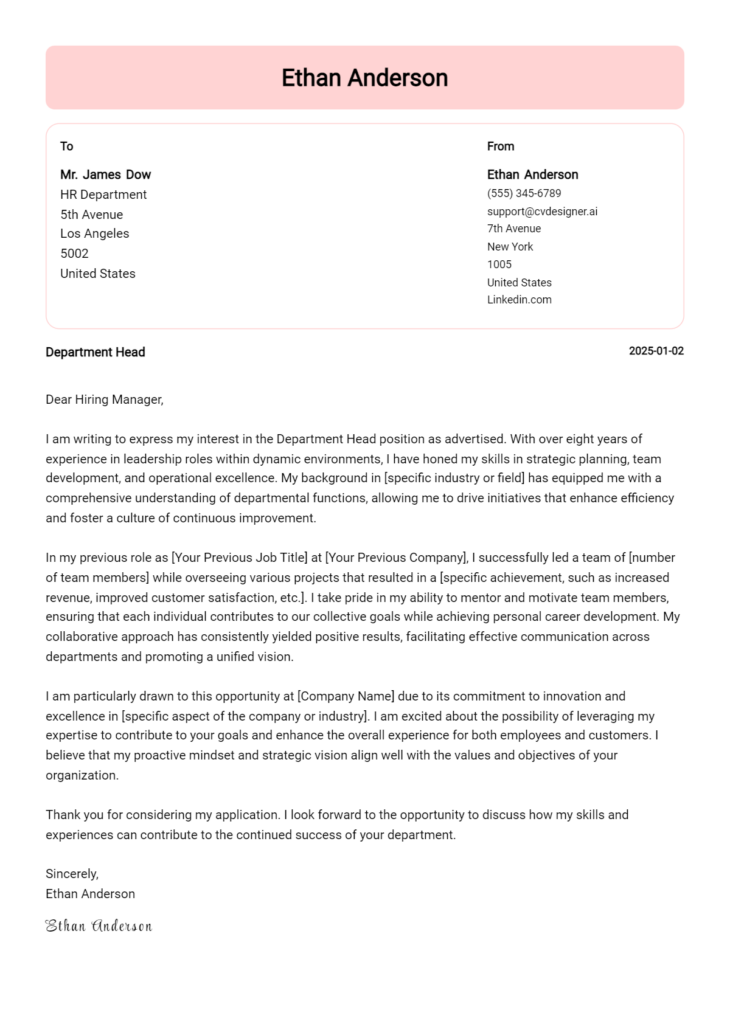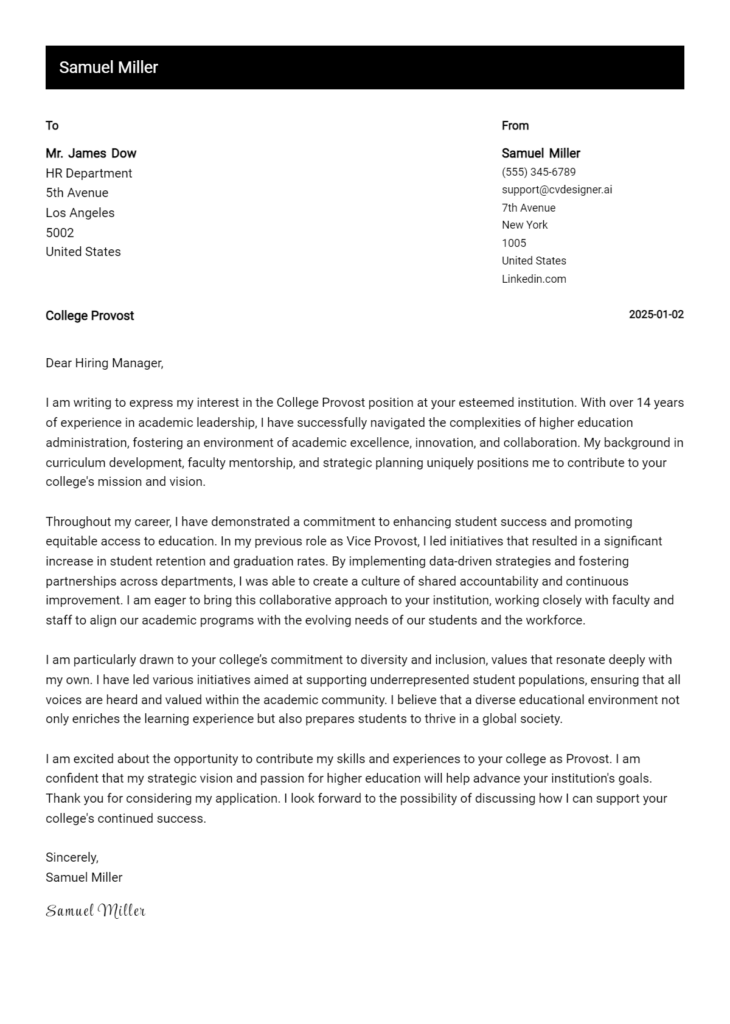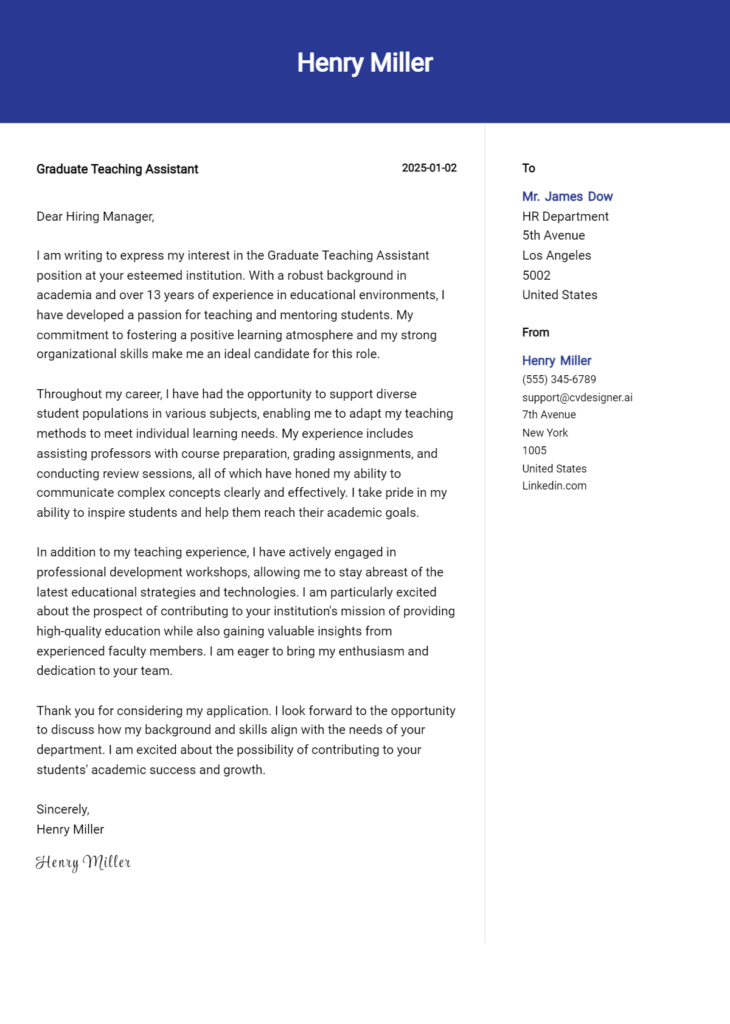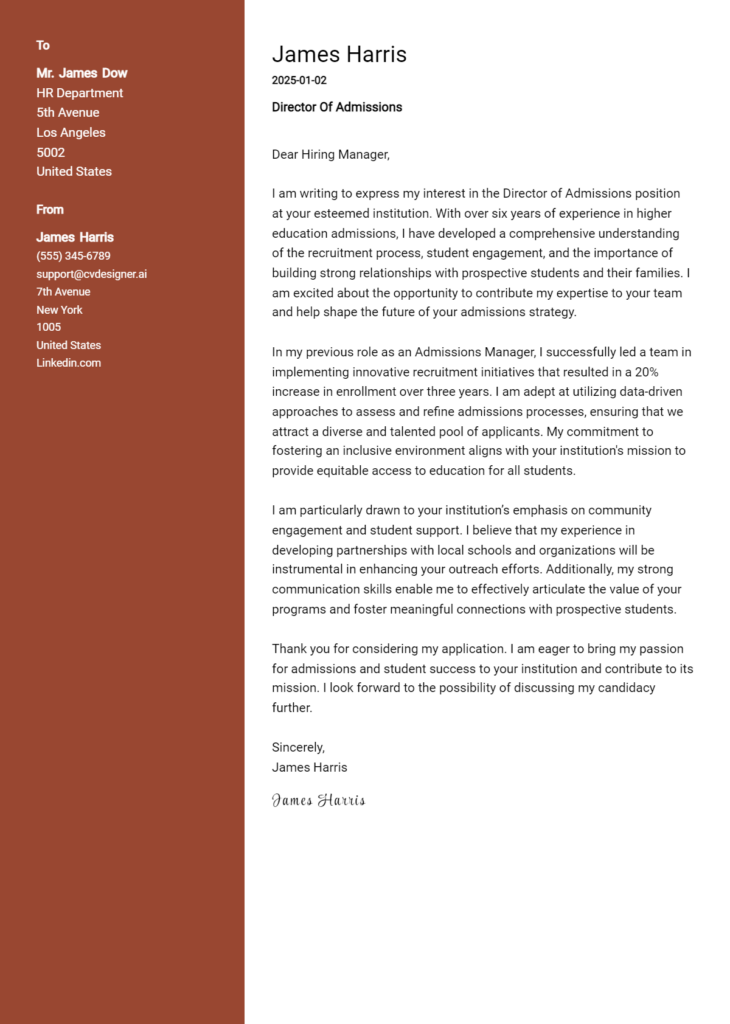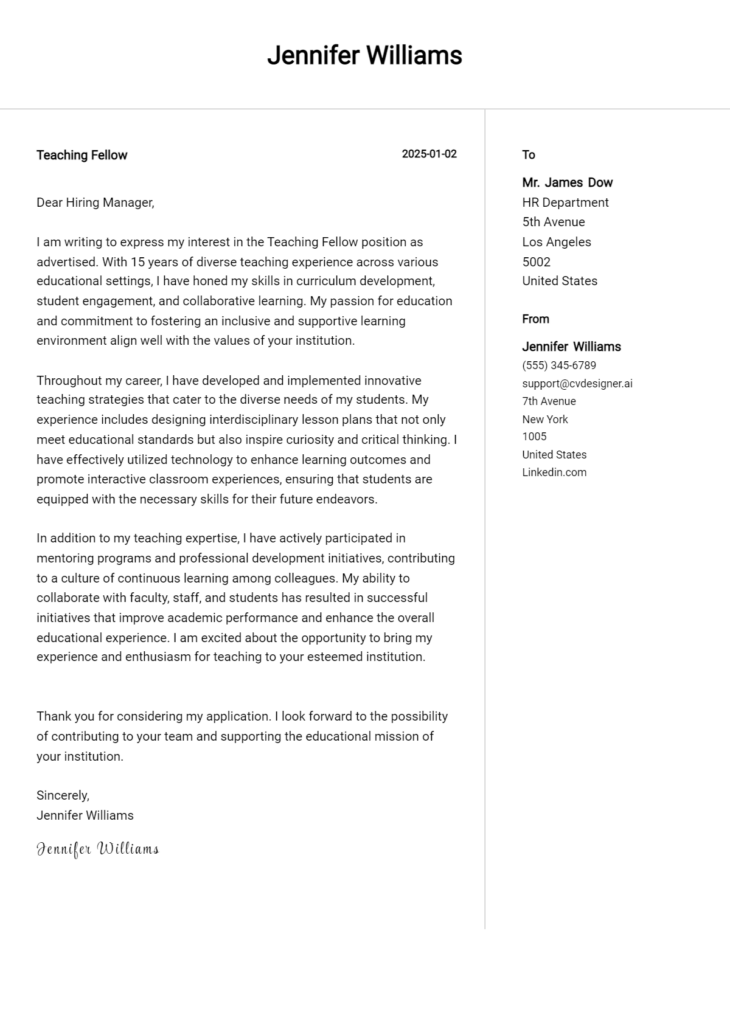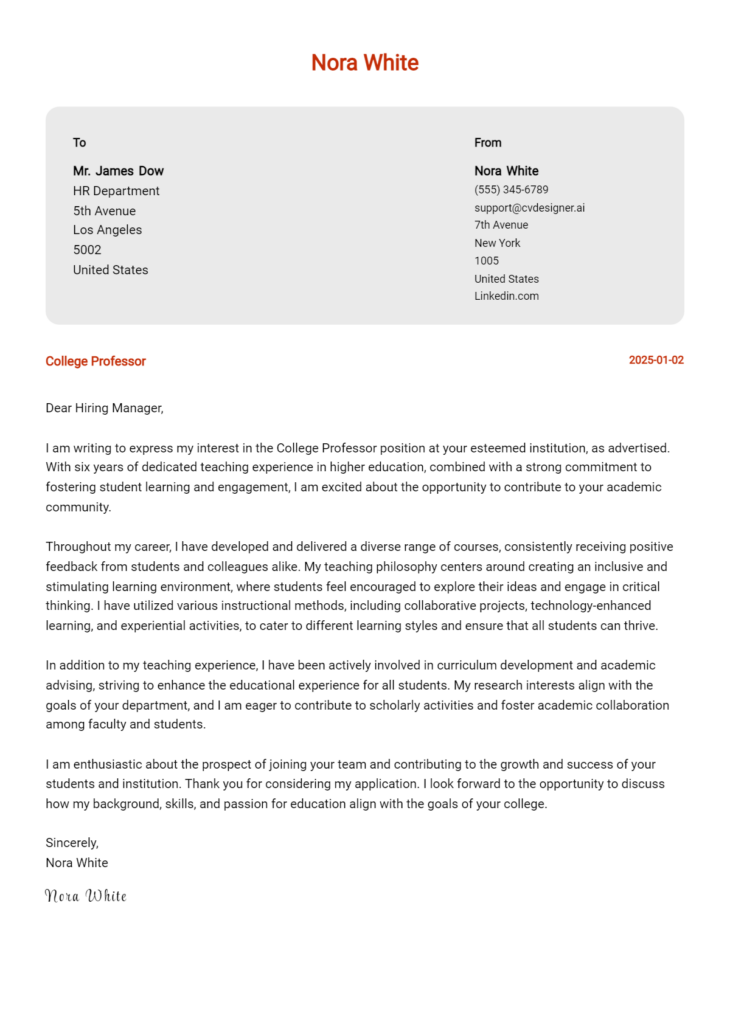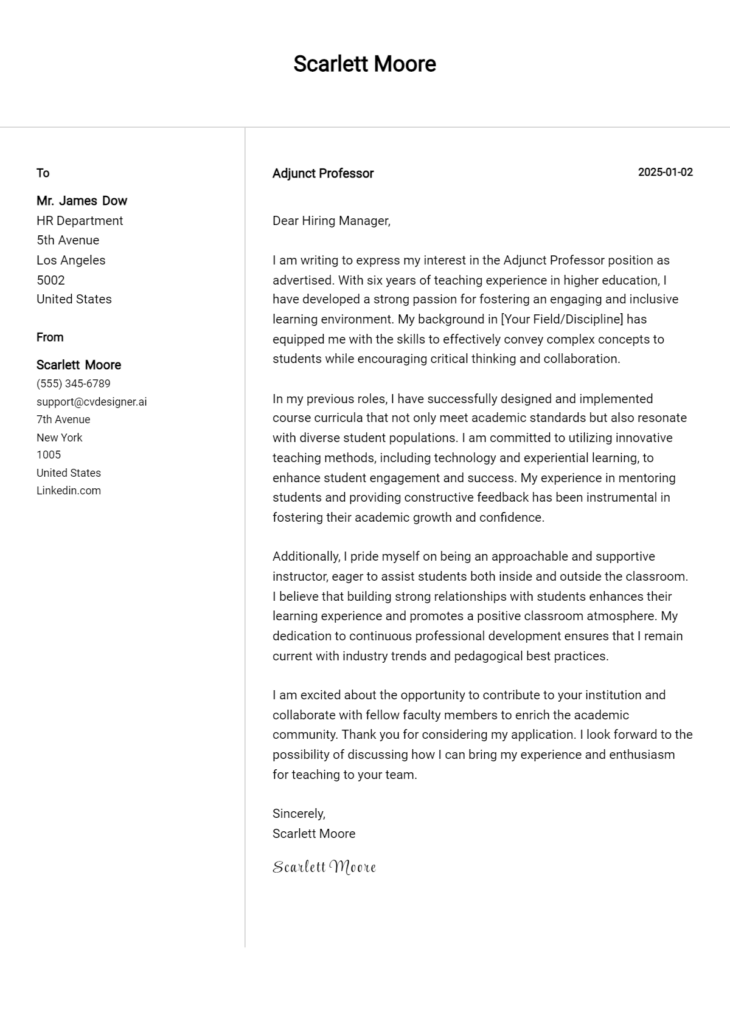University Research Assistant Cover Letter Examples
Explore additional University Research Assistant cover letter samples and guides and see what works for your level of experience or role.
How to Format a University Research Assistant Cover Letter?
Crafting a well-structured cover letter is essential for a University Research Assistant position, as it not only conveys your qualifications but also reflects your organizational skills and ability to communicate effectively. The format of your cover letter serves as a first impression; it showcases your professionalism and attention to detail—traits that are highly valued in academic research settings. A well-organized letter can capture the attention of hiring committees, highlighting your enthusiasm for the role and your readiness to contribute to their research initiatives.
In this guide, we'll outline how to structure your cover letter, providing insights and examples tailored for research assistant roles.
We'll focus on the essential components of a professional cover letter, including:
- Cover Letter Header
- Cover Letter Greeting
- Cover Letter Introduction
- Cover Letter Body
- Cover Letter Closing
Each section plays a crucial role in emphasizing your qualifications and dedication to the research field. Let’s break down each part and explore how to make your cover letter stand out.
Importance of the Cover Letter Header for a University Research Assistant
The header of a cover letter is a critical component that sets the tone for the entire document. It serves as the first impression and provides essential information about the applicant and the context of the application. A well-structured header includes the applicant's contact information, the date, and the recipient's details, ensuring clarity and professionalism. This not only makes it easy for the reader to identify the applicant and their intent but also reflects the applicant's attention to detail and organizational skills—qualities that are vital in a research environment.
A strong header conveys professionalism and makes it easy for hiring committees to follow up, while a weak header can lead to confusion or miscommunication. Below are examples of a strong and weak cover letter header for a University Research Assistant position.
Strong Example
John Doe 123 Main St Cityville, ST 12345 johndoe@email.com (123) 456-7890 October 1, 2023 Dr. Jane Smith Department of Biology University of Science 456 College Ave Cityville, ST 12345
Weak Example
No Name Unknown Address 12345 Today To Whom It May Concern
The Importance of the Cover Letter Greeting
The greeting of a cover letter is a crucial element that sets the tone for the rest of the document. It serves as the first impression for the hiring manager and establishes a sense of professionalism and personalization. By addressing the recipient directly, you demonstrate your attention to detail and genuine interest in the position. To enhance your cover letter, it's essential to avoid generic greetings such as "To Whom It May Concern." Instead, take the time to research the hiring manager's name or title to create a more engaging introduction. This effort not only reflects your commitment to the role but also helps you stand out among other candidates.
Here are some examples of strong and weak greetings for a University Research Assistant cover letter:
Strong Greeting Example
Dear Dr. Jane Smith,
Weak Greeting Example
To Whom It May Concern,
The Importance of a Strong Cover Letter Introduction for a University Research Assistant
A well-crafted cover letter introduction is crucial for any applicant seeking a University Research Assistant position. It serves as the first impression to the hiring manager, and an engaging introduction can significantly increase the chances of the candidate being invited for an interview. This section should capture the reader's attention, clearly express the candidate's interest in the role, and briefly highlight relevant skills or achievements that align with the job requirements. By effectively setting the tone for the rest of the letter, a strong introduction can differentiate a candidate from the competition.
Strong Example
Dear Dr. Smith, I am excited to apply for the University Research Assistant position in the Department of Biology at XYZ University. With a Bachelor’s degree in Environmental Science and over two years of hands-on experience in laboratory research, I am well-prepared to contribute to your ongoing projects on ecosystem dynamics. My passion for environmental conservation, coupled with my proficiency in data analysis and experimental design, positions me as a strong candidate for this role.
Weak Example
To whom it may concern, I am writing to apply for the University Research Assistant position. I think it would be a good job for me since I have some experience in research. I have done a few projects during my studies and I am looking for a job.
Purpose of the Cover Letter Body for a University Research Assistant
The body of a cover letter for a University Research Assistant plays a crucial role in showcasing the candidate's relevant skills, experiences, and overall value to the academic institution. This section allows the applicant to highlight specific projects or accomplishments that demonstrate their ability to contribute effectively to research initiatives. By detailing their hands-on experiences, technical proficiencies, and collaborative efforts in prior research roles, candidates can provide compelling evidence of their capability to support the research team's goals. A well-crafted body also sets the candidate apart by illustrating their passion for the field and their commitment to academic excellence.
Strong Example
I am excited to apply for the University Research Assistant position at XYZ University, where I believe my background in cellular biology and hands-on experience in laboratory research will be invaluable. During my undergraduate studies, I successfully led a project investigating the effects of a novel compound on cell proliferation, which resulted in a presentation at the National Biology Conference. My proficiency in utilizing various analytical techniques, such as PCR and flow cytometry, combined with my collaborative work with faculty on grant proposals, has equipped me with the skills necessary to contribute effectively to your research team. I am eager to bring my dedication and expertise to XYZ University, where innovative research is at the forefront of scientific advancement.
Weak Example
I want to apply for the University Research Assistant job. I have done some research in school, and I think I would be a good fit. I worked on a project once, and it was okay. I know how to use some lab equipment, but I didn't really learn much in school. I am looking forward to working at XYZ University because it sounds like a good place.
Importance of the Cover Letter Closing for a University Research Assistant
The closing of a cover letter is crucial for leaving a lasting impression on the hiring committee. It serves as a final opportunity to summarize your qualifications, reiterate your enthusiasm for the role, and encourage the next steps, such as reviewing your resume or scheduling an interview. A strong closing can reinforce your fit for the position and demonstrate your proactive attitude, while a weak closing can diminish your overall message and leave the reader uncertain about your interest or qualifications.
Strong Example
Thank you for considering my application for the University Research Assistant position. I am excited about the opportunity to contribute to your research on sustainable energy solutions, as my background in environmental science and hands-on laboratory experience align well with the goals of your team. I look forward to the possibility of discussing my application further and am eager to elaborate on how my skills can benefit your research. Please feel free to review my attached resume, and I hope to hear from you soon to schedule an interview.
Weak Example
Thanks for reading my letter. I hope you think about my application. My resume is attached if you want to look at it. Let me know if you want to talk about it later.
These tips will help candidates craft an effective cover letter for a University Research Assistant position, a critical step in showcasing their qualifications and enthusiasm for research. A compelling cover letter not only highlights your technical skills and problem-solving abilities but also emphasizes your understanding of the Software Development Life Cycle (SDLC), teamwork, and your passion for continuous learning. Here are five detailed tips to ensure your cover letter stands out.
Tips for Writing an Effective Cover Letter
Highlight Relevant Technical Skills
When applying for a University Research Assistant position, it’s crucial to emphasize your technical skills that are relevant to the research field. Specify programming languages, software tools, or methodologies you are proficient in, and provide examples of how you've applied these skills in previous projects. This will demonstrate your readiness to contribute effectively from day one.Showcase Problem-Solving Abilities
Research often involves tackling complex problems. Use your cover letter to illustrate instances where you've successfully identified and solved challenges in your previous research or academic work. Discuss specific methodologies you employed and the positive outcomes that resulted from your problem-solving efforts.Demonstrate Knowledge of SDLC
Understanding the Software Development Life Cycle (SDLC) is often vital for research projects that involve software development. Briefly explain your experience with each phase of the SDLC, from requirements gathering to testing and maintenance. This will convey your ability to contribute to software-related research projects effectively.Emphasize Teamwork Experiences
Research is rarely a solo endeavor. Highlight your experiences working in teams, including any collaborative research projects, lab work, or group assignments. Discuss how your ability to communicate and collaborate with others contributed to the success of these initiatives. This will show that you are a team player who can thrive in a collaborative environment.Express a Passion for Continuous Learning
The field of research is ever-evolving, and a commitment to continuous learning is essential. In your cover letter, share your enthusiasm for staying updated with the latest developments in your field. Mention any workshops, courses, or conferences you’ve attended, and express your eagerness to further your knowledge and skills while contributing to the research team's objectives.
For additional assistance, consider exploring various cover letter templates and utilizing a cover letter builder to help structure your content effectively. These resources can make the writing process smoother and more efficient, allowing you to focus on personalizing your application.
Common Mistakes to Avoid in a University Research Assistant Cover Letter
Crafting a compelling cover letter is essential for standing out in the competitive field of academic research. Avoiding common mistakes can significantly enhance your chances of securing an interview. Here are some pitfalls to watch out for:
- Generic Content: Using a one-size-fits-all cover letter can make you appear uninterested. Tailor your letter to the specific position and institution.
- Lack of Specificity: Failing to mention specific skills or experiences relevant to the research assistant role can weaken your application. Highlight your relevant coursework or lab experience.
- Ignoring Formatting Guidelines: A poorly formatted cover letter can detract from your professionalism. Adhere to proper cover letter format to ensure clarity and readability.
- Spelling and Grammar Errors: Mistakes in your writing can give the impression of carelessness. Always proofread your cover letter or have someone else review it.
- Overly Casual Tone: Maintaining a professional tone is crucial in academic settings. Avoid slang or overly casual language to convey your seriousness about the position.
- Focusing Solely on Yourself: While it's important to discuss your qualifications, also emphasize how you can contribute to the research project or team. Show enthusiasm for the work being done.
- Neglecting to Include Relevant Experiences: Many applicants forget to mention previous research or assistant roles. Include specific cover letter examples that showcase your experience and achievements.
By steering clear of these common mistakes, you can create a strong cover letter that effectively communicates your qualifications and enthusiasm for the role of a University Research Assistant.
Cover Letter FAQs for University Research Assistant
What should I include in my cover letter for a University Research Assistant position?
In your cover letter, include your contact information, the date, and the recipient's details at the top. Start with a strong opening that states the position you are applying for and where you found the listing. Discuss your academic background, particularly relevant coursework or research experience, and specific skills that align with the job description. Include a brief overview of any prior research projects, publications, or relevant techniques you are proficient in. Finally, express your enthusiasm for the position and how it aligns with your career goals, and conclude with a professional closing and your signature.
How can I tailor my cover letter for a specific research project?
To tailor your cover letter, begin by researching the specific project or research area you are applying for. Mention the principal investigator's name and their work to show your familiarity and interest. Highlight relevant experiences or skills that directly relate to the research goals, such as specific methodologies or analytical techniques you've mastered. Use keywords from the job description to make your application stand out. Additionally, consider mentioning any personal experiences or interests that align with the project to convey your genuine passion for the research topic.
How long should my cover letter be?
Your cover letter should typically be one page long, consisting of three to four paragraphs. Aim for a length of around 250 to 400 words to ensure you provide enough detail without overwhelming the reader. Start with a concise introduction, then delve into your qualifications and experiences in the body paragraphs. Each paragraph should focus on a specific aspect, such as your academic background, research skills, and relevant experiences. In the conclusion, reiterate your enthusiasm for the position and express your desire for an interview. Keeping it concise and focused will make a stronger impact.
Should I include references in my cover letter?
No, you should not include references in your cover letter. Instead, focus on showcasing your qualifications, experiences, and skills relevant to the University Research Assistant position. Mentioning that references are available upon request is a good practice, which indicates you have individuals who can vouch for your qualifications. When submitting your application, ensure you have a separate reference list prepared to provide when asked. This approach keeps your cover letter focused and polished, highlighting your ability to communicate effectively and professionally.
Build your Cover Letter in minutes
Use an AI-powered cover letter builder and have your letter done in 5 minutes. Just select your template and our software will guide you through the process.

